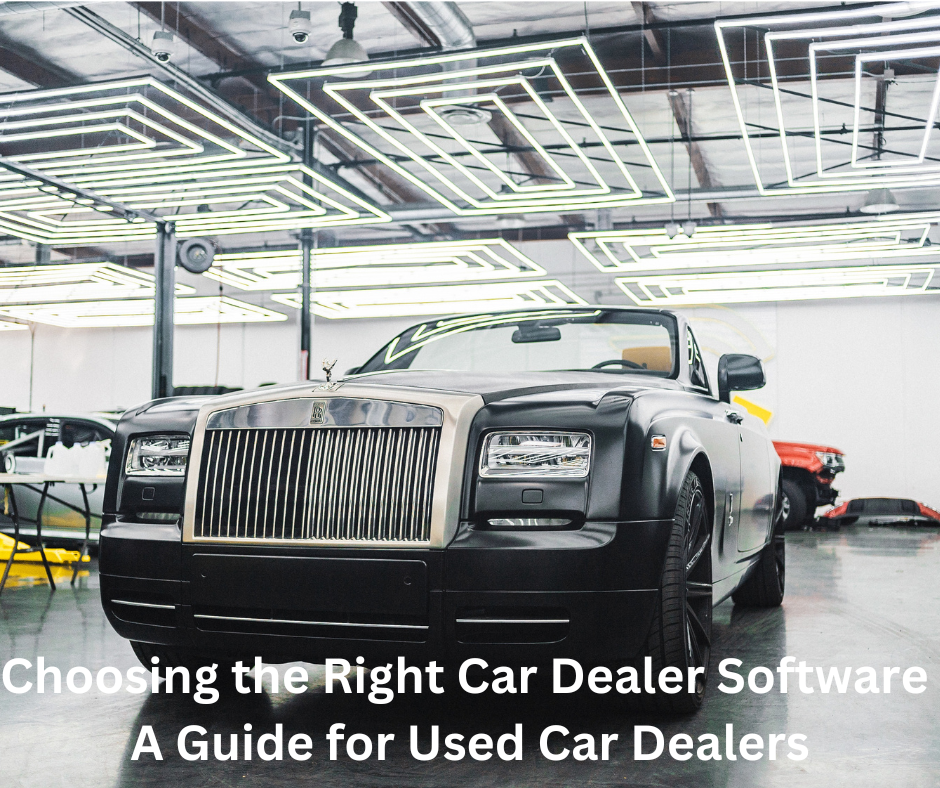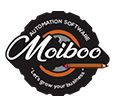Introduction:
In today’s highly competitive automotive market, running a successfully used car dealership requires efficient management and streamlined processes. One key tool that can significantly enhance your operations is the right car dealer software. The software you choose can make a significant impact on your dealership’s productivity, customer satisfaction, and ultimately, your bottom line.
However, with a multitude of options available, selecting the most suitable software can be a daunting task. In this guide, we will explore the essential factors to consider when choosing car dealer software, empowering used car dealers to make an informed decision that aligns with their specific business needs.

Identify Your Dealership’s Requirements:
Before embarking on the search for car dealer software, it’s crucial to evaluate your dealership’s unique requirements. Every dealership operates differently, and understanding your specific needs will help you narrow down your options effectively. Consider factors such as inventory management, sales tracking, CRM (Customer Relationship Management), accounting, and reporting.
Determine the features and functionalities that are essential to streamline your daily operations and provide an excellent customer experience. Assess whether you need cloud-based software for remote access or an on-premise solution for enhanced data control and security.
Research and Compare Software Providers:
Once you have a clear understanding of your dealership’s requirements, it’s time to research and compare different software providers. Look for reputable companies that specialize in car dealer software and have a proven track record in the automotive industry.
Read reviews, testimonials, and case studies to gather insights into their software’s reliability, usability, and customer support. Consider the provider’s experience, customer base, and commitment to innovation and regular updates.
Make a list of software providers that align with your needs and reach out to them for more information. Ask for detailed demonstrations or trial versions to experience the software firsthand. During these interactions, pay attention to the user interface, ease of use, and the software’s ability to integrate with your existing systems, such as DMS (Dealer Management System) or CRM tools.
Assess System Scalability and Flexibility:
As your used car dealership grows, your software should be able to keep up with the increasing demands. Scalability is a vital consideration when choosing car dealer software. Ensure that the software can handle your current inventory size and accommodate future expansion. It should support multiple users and provide role-based access to ensure data security.
Moreover, flexibility is key to adapting to changing market trends and consumer expectations. Look for software that allows customization and configuration according to your dealership’s unique processes and branding requirements. The ability to integrate with third-party tools, such as online marketplaces or payment gateways, is also crucial for maximizing your dealership’s reach and operational efficiency.
Consider Training and Support:
Implementing new software involves a learning curve for your dealership staff. Therefore, consider the training and support options provided by the software provider. A comprehensive onboarding process and training resources can help your team quickly adapt to the new system and leverage its full potential. Additionally, ensure that the provider offers reliable technical support and regular software updates to address any issues or incorporate new features.
Evaluate Cost and Return on Investment:
Finally, consider the cost of the software and the potential return on investment (ROI). While budget is a crucial factor, it’s important not to compromise on essential features and quality for the sake of cost. Look for software that provides long-term value and aligns with your budgetary constraints.
Calculate the ROI by estimating the time and cost savings the software can bring to your dealership’s operations, improved sales efficiency, reduced errors, and enhanced customer satisfaction.
Conclusion:
Choosing the right car dealer software is a critical decision that can significantly impact the success of your used car dealership. By identifying your dealership’s requirements, researching and comparing software providers, assessing system scalability and flexibility, considering training and support, and evaluating cost and ROI, you can make an informed choice.
Remember, the right software should streamline your operations, enhance customer experience, and provide a solid foundation for future growth. Invest the time and effort in selecting the best car dealer software for your dealership, and reap the benefits of increased efficiency and profitability in the long run.

Looking for pre-approved used car dealer software that qualifies for the PSG Grant? Look no further than Moiboo used car dealer software. This software solution is specifically tailored to meet your unique business requirements, offering a comprehensive range of features to automate and streamline your operations effectively.
Moiboo used car dealer software is meticulously designed to ensure seamless operations throughout your entire workflow, optimizing every aspect of your business processes. To fully understand the extensive benefits this software provides, we invite you to click the link below and request a free demo.
To discover more about Moiboo used car dealer software and schedule your free demo, please don’t hesitate to contact us at +65 9895 1817. Our dedicated team is ready to assist you in exploring the capabilities of Moiboo used car dealer software and how it can revolutionize the efficiency and success of your dealership.

FAQS:
How to achieve success in a used car business?
To achieve success in a used car business, focus on developing a solid business plan that outlines goals and strategies, curating a reliable inventory, implementing effective marketing techniques to reach the target audience, providing exceptional customer service, embracing technology for streamlined operations, building strong industry partnerships, staying updated with market trends, prioritizing reputation and trust, continuously learning and improving, and monitoring key performance indicators to make data-driven decisions for optimized business operations.
What is the future of the second-hand car market in Singapore?
The future of the second-hand car market in Singapore appears promising, driven by various factors. With increasing COE (Certificate of Entitlement) prices for new cars, more consumers are likely to turn to the used car market as a more affordable alternative.
The growing emphasis on sustainability and environmental consciousness may also contribute to the demand for pre-owned electric and hybrid vehicles.
Additionally, advancements in technology, such as improved vehicle inspections and online platforms, will enhance transparency and convenience for buyers.
However, evolving regulations, changing consumer preferences, and market dynamics will shape the future trajectory of Singapore’s second-hand car market.
